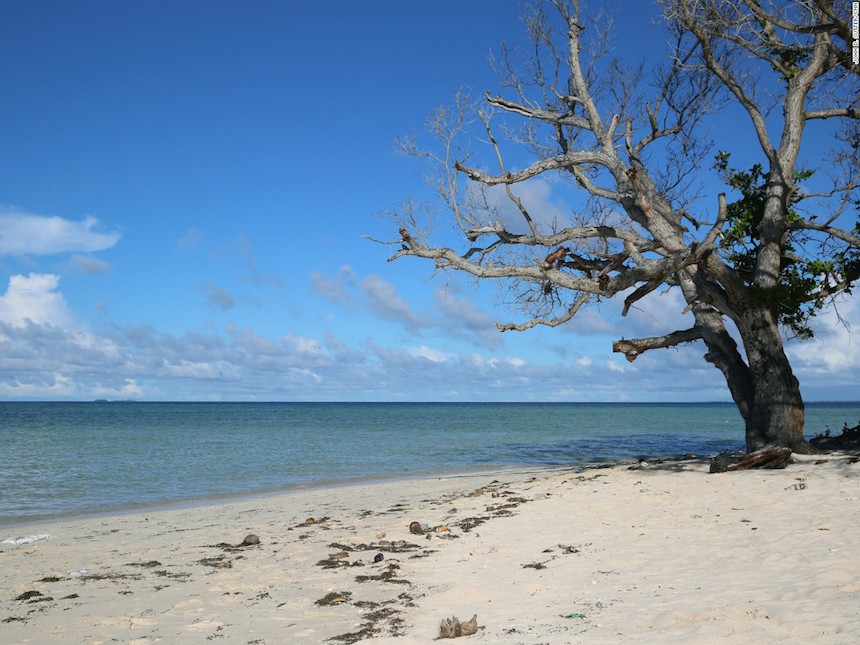
Though climate change has been an internationally recognized challenge since the United Nations Framework Convention on Climate Change in 1992, efforts towards reducing carbon emissions by governments remain uneven and insufficient.
Notable effects of global warming include the melting of polar ice (as demonstrated by the giant iceberg that recently broke away from Antarctica) and rising sea levels, as well as dramatic and irregular weather, which together can put our fragile environment under stress.
Even so, as of today, out of 195 state parties to the 2015 Paris climate agreement, only 148 have ratified it. While some countries evidently do not fully appreciate the sense of urgency, island nations have no such luxury.
The first casualties of global warming
Conceptually, state sovereignty is demarcated by physical territory. For island states, that means, in effect, their shoreline.
As sea levels rise, many island states could soon be annihilated and their residents forced to flee, rendering extinct their societies.
The latest report on rising sea levels released in January 2017 by the US National Oceanic and Atmospheric Administration (NOAA), predicts the worsening scenario of global sea levels rising between 0.3 and 2.5 metres by the year 2100. This projection is an increase from the group’s December 2012 estimate of a maximum rise of two metres.
Driven by the urgency to deal with the effects of rising sea levels, an Alliance of Small Island States (AOSIS) was established in 1990. Today, AOSIS consists of 19 countries in the Atlantic Ocean, 16 countries in the Pacific Ocean, four countries in the Indian Ocean, and five observers.
The Polynesian island of Tuvalu is one of them. There, freshwater supply from reservoirs are already gradually being replaced by seawater. In parallel, it is also being contaminated by sewage. Agricultural production, Tuvalu’s economic lifeline, will likely be affected by the diminishing supply of potable water.
 Tuvalu is among those islands facing an imminent risk of extinction.
Tuvalu is among those islands facing an imminent risk of extinction.
Tomoaki INABA, CC BY-SA
Any viable options?
Nature does not negotiate with any country, regardless of its wealth or military power. And unfortunately, right now, it’s small island states such as Tuvalu and their ilk that face the brunt of it at the front lines of climate change.
These states will experience a variety of severe climate-change induced effects, ranging from coastal erosion, loss of human lives, to damaged infrastructure and the displacement of fish stocks.
Given that the territorial integrity of many island nations is so severely threatened by rising sea levels, should we expect all 39 AOSIS members to begin arrangements for the large-scale exodus and resettlement of their populations?
This would be a tall order, considering the current anti-globalisation sentiment. Many non-AOSIS countries are unlikely to accept large-scale immigration from these island nations within a short time window, though political leaders may be willing to offer sanctuary on humanitarian grounds.
In the meantime, as the international community continues to negotiate global carbon-reduction goals as if they were trade barriers, more concrete and proactive remedial steps could be taken to preserve small island states from imminent disappearance.
Taking a page from China’s speedy reclamation experience in the South China Sea, one solution may be to construct and expand these small island states into sizeable landmasses.
Environmentalists and NGOs may cringe at the thought of the large-scale reclamation of island states in the Pacific, Atlantic or Indian oceans, and, like any massive engineering project, this approach raises valid environmental concerns.
But in lieu of an immediate global consensus on carbon neutrality, this is a solution that multilateral financial institutions and international organisations, such as the the Asian Infrastructure Investment Bank (AIIB), the Asian Development Bank (ADB) and the United Nations, could consider setting up either single-handedly or jointly a fund to rebuild and re-inhabit small island states.
Based on the Dutch model, this fund could be used for land reclamation, creating new and expanded territories for these island states and erecting a five-metre storm surge barrier comparable to the Holland’s Maeslantkering.
Such a grand undertaking would be an engineering marvel – with a hefty pricetag to match.
If individual small island states could negotiate with such like-minded countries as China, Japan and the Netherlands, they might start a strategic joint-venture partnership. To be sure, such relationships – with their great power asymmetries – must be delicately managed and based solely on environmental cooperation. No politics can be involved.
If better-off international partners are willing and able to exercise this extra sensitivity and, rather than take advantage of the smaller island states, grant them preferential treatment instead, it could forge a new path for global cooperation around shared climate challenges.
Small island states could grant tenure to partner countries to safeguard and invest in an island or group of islands for a 99-year period, say. Together, they would co-develop marine-based industries such as sustainable aquaculture and renewable energy sources, such as floating solar farms and tidal-powered generators.
Reclaimed land could also be developed for sustainable agriculture, and the marine ecosystem at these reclaimed islands could offer a large untapped resource for drug research and development.
![]() Finally, in this era of responsible travel, it’s easy to imagine that newly reclaimed islands could become tourist destinations, thus providing additional income for these fragile island nations as they face an ever-more-difficult future.
Finally, in this era of responsible travel, it’s easy to imagine that newly reclaimed islands could become tourist destinations, thus providing additional income for these fragile island nations as they face an ever-more-difficult future.
Christopher H Lim, Senior Fellow in Science, Technology & Economics at RSIS, Nanyang Technological University and Vincent Mack, Associate Research Fellow in Non-Traditional Security Studies at RSIS, Nanyang Technological University
This article was originally published on The Conversation. Read the original article.
